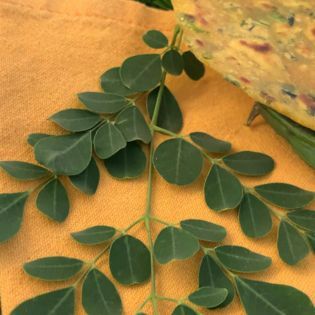MORINGA LEAVES

Every part of the Moringa plant is edible. Moringa oleifera leaves, seeds, bark, roots, sap and flowers are widely used in traditional medicine and the leaves and immature seed pods are used as food products. The most used part of the plant is the edible leaves and the dried leaves are sold as dietary supplements either in a powdered or capsule form. Moringa is a nutrient-packed food that comes from the Moringa oleifera tree in India. Moringa oleifera leaves, seeds, bark, roots, sap, and flowers have long been used in traditional medicine throughout South Asia and Southeast Asia. Moringa powder is often added to smoothies, nutrition bars, and energy drinks or drank as tea. In oil form, it is used topically for hair and skincare.
Nutritional Content Of Moringa Leaves (100g)
- Calories - 64kcal
- Carbohydrates - 8.28g
- Fiber - 2g
- Fats - 1.40g
- Protein - 9.40g
Extremely Nutritious
- Moringa leaves are one of the most nutrient-dense greens on the planet, packed with protein, essential amino acids, 27 vitamins and 46 antioxidants. That includes key nutrients like calcium, iron, B vitamins, potassium, magnesium, and vitamin C. Overall, moringa is rich in macro- and micronutrients and other bioactive compounds which are vital for the normal functioning of the body and prevention of many diseases.
Fights Inflammation
- Inflammation is a physiological response that happens in the body to protect against infection and restore body tissue injury. Moringa contains inflammation-fighting nutrients including phytonutrients, antioxidants, and antibacterial compounds. Together, these powerful compounds fight inflammation in the body by targeting free radicals (compounds that damage cells) and as a result reduces oxidative stress, inflammation, and fights disease. Two compounds of note are quercetin, a potent antioxidant and anti- inflammatory agent, and isothiocyanates, which aid in detoxification and have anti-inflammatory effects. One study suggests that these specific compounds found in moringa may help alleviate low-grade inflammation associated with chronic diseases.
Balances Blood Sugar
- This edible plant might keep your blood sugars stable for the better. Moringa is believed to aid in blood sugar balance thanks to its chlorogenic acid and isothiocyanates. Chlorogenic acid can potentially control blood sugar levels by regulating the cells uptake or release of glucose (sugar) following a meal. Studies have supported the use of moringa to aid in blood. sugar balance with positive effects on fasting blood sugar levels, insulin levels, HbA1c and overall blood glucose control in those that consume moringa powder.
Manages Asthma
- Drumstick leaves also help to manage as well as prevent respiratory disorders such as asthma and bronchial constrictions. Due to their anti-inflammatory properties, moringa leaves also help to prevent inflammation in the airways. Research has suggested that moringa leaves may also help to improve lung capacity and function. The presence of Vitamin C and E in high concentrations in moringa leaves has been known to combat neural degeneration while improving brain and cognitive function.
Nourishing Skin & Hair
- Moringa or drumstick leaves contain an abundance of antioxidants and essential nutrients that help improve the health and appearance of the skin as well as the hair. By reducing oxidative stress, moringa benefits the skin by making it appear more supple and adding shine, along with reducing wrinkles and fine lines. Additionally, moringa leaves may also help to reduce dandruff and add bounce to hair, along with strengthening the hair follicles and making hair stronger. Moringa leaf oil may also help to work effectively on acne and is a prominent component of various acne- controlling cosmetic products. They add a healthy glow to the skin by purifying the skin from within.
- Moringa or drumstick leaves are nutritionally rich and abundant in the essential nutrients needed to support good health and prevent diseases. These leaves have found their place in Indian cuisine in many ways due to their versatility. Most commonly, drumstick leaves are stir-fried and mixed with other vegetables to enhance the nutritional value of dishes. Even the moringa leaves can be used in a drink due to the excellent moringa leaves juice benefits and nutritional value.


